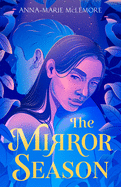
Anna-Marie McLemore's seventh YA novel, The Mirror Season, is intelligent, brutal and exquisitely written. This novel, like many of their previous works (Dark and Deepest Red), is a contemporary retelling of a fairytale ("The Snow Queen") with elements of magical realism.
Graciela Cristales is "the pastry witch of San Juan Capistrano": the girl "who knows what kind of pan dulce you want before you do." This gift has made Ciela something of an "obscure tourist attraction" at her family's pastelería. Ciela was the type of girl who "reveled in... her brown skin... matching [her] lace-trimmed underwear to [her] makeup." But the party changed that. This season is "strange": "No Santa Anas. Trees vanishing right out of front yards." When commonplace items begin turning to glass, a shard gets stuck in Ciela's eye. At the party, Ciela and Lock Thomas were both sexually assaulted. Ciela tried to help Lock, a visiting white boy who had been drugged into unconsciousness, but believes she instead put them both in danger. Now, she wants only to forget. When Lock shows up as a new student, though, he notices right away that Ciela has "the something-happened look," meaning that the boy who can't remember his assault is going to make Ciela remember her own.
An author's note says, "this book draws on my experiences as a survivor of multiple sexual assaults," and it is clear that this is the book of McLemore's wounds. Their craft is superb and the emotions they describe are raw and realistically confused. There are places where the story doesn't quite connect, but that takes nothing away from the ferocious beauty of The Mirror Season. --Siân Gaetano, children's and YA editor, Shelf Awareness

